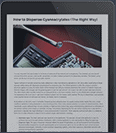What is the Best Super Glue for Bonding Rubber and Thermoplastic Elastomers?
Selecting the proper adhesive for a rubber bonding application demands a consideration of the processing and performance characteristics of the adhesive as well as the substrate material you will be bonding together. Depending on the application , you may need to adhere rubber to different substrates ranging from plastic to metal which might be flexible to hard, or even other rubber materials — each one presenting unique adhesion challenges.
In this blog, we discuss a list of qualities to look for when choosing the best adhesive for rubber adhesion applications.
Points to Consider for Rubber Adhesion
There are many types of rubber, with some being more commonly used than others. Below are some of the general rules of working with rubber that will guide you in selecting the best super glue for your rubber adhesion application.
Know Your Rubber
Knowing which type of rubber you are working with will help you to pick the best glue. Different types of rubbers have different levels of flexibility, hardness and porosity. Some of the most common types of rubber you may encounter include EPDM sponge rubber, natural rubber, silicone rubber, nitrile rubber, butyl rubber, and polyurethane rubber.
Silicone and natural rubber are hard rubbers. Soft rubbers have a lower sulfur content and are more elastic than hard rubber. Choosing an adhesive that pairs with current and future rubber uses will be an effective strategy.
Trade names as well as supplier names will clue you in onto the specific type of rubber you are attempting to bond. For instance, Buna is a trade name (think brand) of Styrene-Butadene Rubber (SBR) manufactured by Bayer. This information will help in the selection of the right adhesive when communicating with your adhesive manufacturer.
Surface Prepping (Treatment)
Because of its varied processing methods (think extruded, molded), your chosen rubber could have a variety of lubricants, mold releases or impurities on the surface that can affect the quality of the bond you achieve. It is advisable to degrease the rubber with a gentle solvent like isopropanol and in some cases simple soap and water before attempting to bond to it.
Some rubbers like silicone and other engineering elastomers using polyolefin plastics may require a primer in order to achieve the highest possible bond strength.
Curing Time
In general, super glue is the best choice for rubber bonding. It cures faster than other adhesives and quickly indicates whether or not the bond will last. If the bond fails quickly, you may be dealing with hard to bond rubber material (see surface treatment options)
Properties: Physical, Chemical, and Thermal
To achieve a strong bond, you need to consider the physical, chemical, and thermal properties of the glue you select. If the rubber part will be exposed to high temperatures, you will need a rubber adhesive that can also withstand high temperatures. For flexible rubber applications like hoses or extrusion profiles, you will need to ensure your adhesive has enough flexibility to pass a 90° or 180° bend of the bond line test. For materials with high porosity (think foam rubber), you may need to consider a heavier viscosity to avoid it soaking into the pores of the rubber and creating a weak or no bond. Matching the properties of your adhesive to the properties of the rubber substrate will ensure a strong, long-lasting bond.
Standing the Test of Time
Some rubbers have a plasticizer that will work its way to the surface and jeopardize your bond in the future. It is important to consider the durability and flexibility of your adhesive in different applications. It needs to be strong enough to stretch and bend without cracking. Cyanoacrylate (the chemical name for super glue) is the most effective option for rubber bonding.
Choosing the Best Super Glue for Rubber Adhesion
What is Cyanoacrylate?
Cyanoacrylate is the industrial term and chemical name for super glue. The term cyanoacrylate glue is used to describe quick-bonding super glues that can be used to adhere to anything from rubber to plastic to metal.
Unlike water-based adhesives, cyanoacrylate is composed of an acrylic resin (monomer) that turns to plastic (polymer) after the curing process. Cyanoacrylate adhesives are a one-part, room-temperature curing adhesive that is only activated when moisture molecules are present on the surface of the substrate, It cannot stick to a dry surface (acidic). Cyanoacrylate is the most versatile and fastest-curing adhesive for rubbers, and the bonds formed during curing are very strong. Super glues are even effective in bonding hard rubbers to a range of substrates.
Types of Cyanoacrylate
At Aron Alpha, we manufacture a wide range of cyanoacrylate adhesives that are available in viscosities ranging from water-thin liquids to thixotropic gels. We also offer ancelary support technologies , including, accelerators, primers, and applicators. Cyanoacrylate is suitable for a wide range of substrates like metals, plastics, rubber, wood, and ceramic.
Our cyanoacrylate glues include:
- Aron Alpha 200 Series: General purpose adhesives for multiple bonding applications with a range of low to high viscosity.
- Aron Alpha 200F Series: Fast-setting, surface-insensitive formula for bonding elastomers and other hard to bond materials.
- Aron Alpha 400 Series: Engineered for high impact and temperature resistance. Exhibits excellent bond strength in conditions up to 250°F.
- Aron Alpha 800 Series: Made from ethoxyethyl-2 cyanoacrylate, this product is low blooming and has low odor to minimize the potential for white haze to occur around the
- Aron Alpha 900 Series: Formulated from ethyl-2 cyanoacrylate, ideal for bonding application that require a flexible bond line and thermal resistance.
- Aron Alpha Accelerators: Can be used to speed the cure of cyanoacrylate adhesives, and are primarily used to reduce fixture times and cure excess adhesive.
- Aron Alpha Primers: Dramatically increase the strength of cyanoacrylate adhesives on hard-to-bond plastics such as polypropylene, polyethylene, silicone rubber, and low-surface-energy thermoplastics./li>
Choose Aron Alpha Super Glue
We understand how daunting it can be to find the best glue for rubber adhesion. At Aron Alpha, we manufacture quality adhesive products, and our broad selection of adhesives is used in a wide range of industries and applications. No matter your requirements, Aron Alpha has you covered.
Contact us or request a quote today to learn more about our solutions for rubber adhesion.





